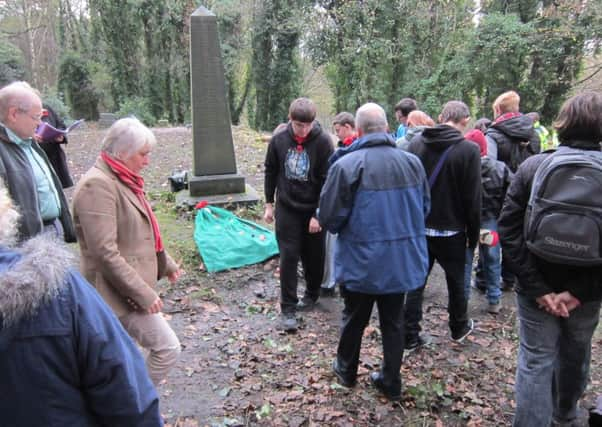Ensuring our children remember sacrifices


But to be honest, a similar poll of adults found that they were as ignorant, with over 60s old being the best informed.
OK, some might say that many of us might remember as far back as that, and so we’ve got an advantage over everyone else, but even if we did is it really any excuse for the obvious gaps in the historical education of those much younger?
Advertisement
Hide AdAdvertisement
Hide AdIt seems to me that it is our duty and that of our educational establishments to educate future generations about our forebears’ sacrifices and take opportunities when they occur to come together to remember their heroism.
Remembrance helps us to learn about shared history which includes all faiths, ages, social classes and all ethnic backgrounds. There is no distinction in war.
Armistice Day on November 11 is one of those times. Also known as Remembrance Day, it is a time to remember the day World War 1 ended in 1918 at 11am, on the 11th day of the 11th month, usually with a two-minute silence and the wearing of a red poppy.
The First World War was described as ‘the war to end all wars’ but of course that was far from the truth and the older you get the more horrific conflicts you witness at first hand through your television screen.
Advertisement
Hide AdAdvertisement
Hide AdThe statistics of the two World Wars are frightening. Growing up in the 1950s there were few of us whose lives were not touched in some way by the Second World War. We didn’t really know much about it as children, but our parents were aware of the loss of fathers, sons, brothers, husbands and sweethearts and with the thousands of others in the UK who lived the rest of their lives with physical or mental scars.
If we do not remember, then sacrifices will have been meaningless.
The Second World War was one of the deadliest in history, with 60 million people worldwide killed, of which 460,000 were from the UK, 3.6 million from Germany and 7 million from Russia.
Add the 38 million worldwide lost in the First World War and the seemingly endless conflicts of recent years, and it’s certainly a lot of people to remember.
Advertisement
Hide AdAdvertisement
Hide AdOne of the most poignant Remembrance ceremonies I’ve ever attended has been at the hauntingly beautiful Wardsend Cemetery at Owlerton, steeped in local history.
Amon countless graves of military personnel laid to rest over the decades is that of Lieutenant, Adjutant George Lambert VC who was severely wounded at the Relief of Lucknow and who was decorated for conspicuous gallantry in the field. He died in Hillsborough Barracks in 1860.
There are many graves of those who died in the Crimea War in Wardsend Cemetery.
These include Robert Sheffield who was present at the Fall of Sebastopol in 1855, and presented with the Crimean medal with clasp for Sebastopol, the Turkish Medal and the medal for Abyssinia.
Advertisement
Hide AdAdvertisement
Hide AdHis coffin was carried on a gun carriage through Wardsend Cemetery with the customary rifle volleys fired and the Last Post played, and so it is fitting that this year’s Remembrance Day ceremony is to be supported by members of the Sheffield Sea Cadets.
This organisation dates back to the Crimean War when sailors returning home from the campaign formed the Navel Lads Brigade to help the many orphans created by the conflict and who ended up on the back streets of sea ports in England.
The first Sea Cadets were started in Whitstable in 1854 and received Royal recognition when Queen Victoria presented the Windsor Unit with £10 for uniforms, which date,
June 25, 1899, became known as the birthday of the Sea Cadets, with its name becoming officially the Navy League Sea Cadet Corps in 1919.
Advertisement
Hide AdAdvertisement
Hide AdA wonderful organisation for young people, Sheffield Sea Cadets provides nautical training in a fun and safe environment, teaching confidence, responsibility and discipline, and supports many events like Remembrance Sunday, Armed Services and Veterans Day and the Royal British Legion’s annual poppy appeal.
The organisation has been affiliated to all three of the Royal Navy’s HMS Sheffields.
The first was built in 1936 and nicknamed ‘The Shiny Sheff’, also having a starring role in the film The Battle of the River Plate.
The second, a guided missile destroyer was annihilated in the Falklands War of 1982 where 22 crew members lost their lives, including local boy Stuart Hanson from Ecclesfield.
Advertisement
Hide AdAdvertisement
Hide AdThe third in 1986 was a Type 22 Frigate which was eventually sold to Chile.
This year’s Remembrance Day Service in Wardsend Cemetery will be held on Friday, November 11 at 11am in the presence of Gill Furniss, the MP for Sheffield Brightside and Hillsborough, and it is hoped that many people will support this quite unique event.
Please assemble at 10.30 am, at the steps up to the cemetery at the end of Livesey Street.
n Sheffield Sea Cadets: 0114 2796223
n Friends of Wardsend Cemetery: 0793 2846773.